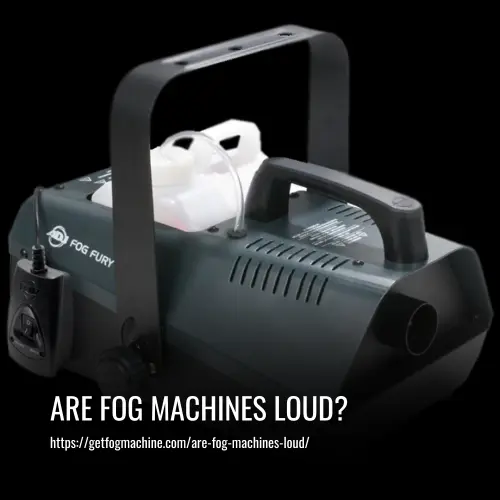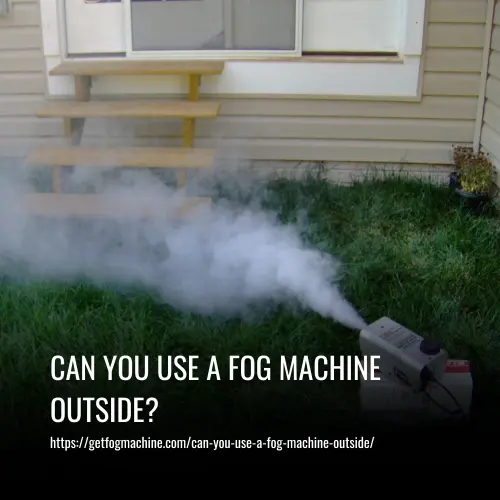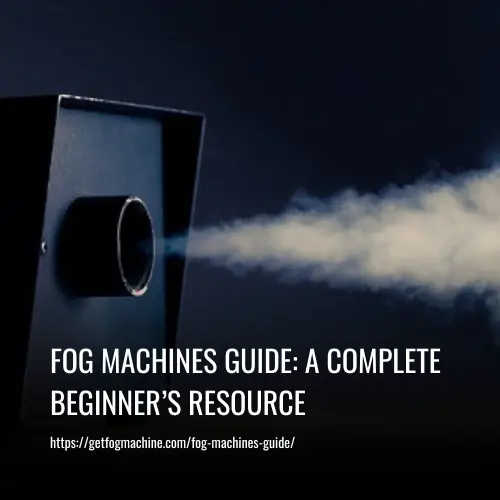Are Fog Machines Loud? A Guide to Understanding Noise Levels
This post contains affiliate links. As an Amazon Associate, we earn from qualifying purchases.
Fog machines can be loud, and the hissing sound they make can be distracting in intimate spaces. This noise can take away from the experience and remind the audience that technology is being used to create the effect.

How Loud are Fog Machines?
Fog machines are not very loud. The loudest they will register is 64dB from 30 feet away, which is about the same as an air conditioner or conversational speech. In comparison, most other machines are around 75dB, which is similar to the noise level of a hair dryer or a toilet flushing.
Common Causes of Fog Machine Loud Noises:
Fog machines can add a dramatic and atmospheric effect to any event or production. However, the noise generated by fog machines can sometimes be a concern. Understanding the factors that contribute to loud noises in fog machines can help users make informed decisions when purchasing, operating, and maintaining these devices. Here are some common causes of fog machine loud noises:
- Mechanical Issues: Poorly constructed parts in fog machines can lead to various issues, including loud noises. When the components of a fog machine are not properly assembled or made with low-quality materials, it can result in excessive vibrations and grinding noises during operation. These noises can be disruptive and take away from the overall experience of using a fog machine.
- The Type of Fog Machine: Different types of fog machines can vary in noise levels. Low-lying fog machines, which use dry ice or special cooling systems to produce a dense fog close to the floor, tend to be quieter compared to standard fog machines. Standard fog machines, which use a high-powered fan to disperse fog throughout the room, typically produce some level of noise.
- Fluid and Residue Buildup: Accumulated fog fluid or residue in the machine’s internal components can obstruct airflow or cause irregularities in the fog production process. This buildup can lead to increased noise levels during operation.
- Clogged Nozzle or Filter: A clogged nozzle or filter can disrupt the fog output and create pressure imbalances within the machine, resulting in loud noises. Regular cleaning and replacement of clogged parts can help prevent this issue.
- Air Leaks: Leaky connections or seals can cause air loss and affect the fog machine’s overall performance. These air leaks can also produce loud, unwanted noises during operation.
- Low Quality of Fog Fluid: Using low-quality fog fluid or not using the appropriate fluid for your specific fog machine can impact its performance and generate excessive noise. Choosing high-quality fog juice can help reduce the noise level.
- Inadequate Maintenance: Neglecting proper maintenance of fog machines can lead to a range of common problems, including loud noises. Buildup of fluid residue and dust, as well as the accumulation of debris, can affect the machine’s performance and potentially cause damage over time.
It is essential for users to be aware of these common causes of fog machine loud noises to ensure optimal performance and a more enjoyable fog machine experience.
Factors That Impact the Level of Fog Machine Noise
Fog machines can add atmosphere and drama to any event or production, but the noise level they produce can vary depending on several factors. Understanding these factors can help you choose a fog machine that meets your noise requirements. Here are the key factors that impact the level of fog machine noise:
- Type of Fog Machine: Different types of fog machines have varying noise levels. Low-lying fog machines that use dry ice or special cooling systems to produce a dense fog close to the floor tend to be quieter compared to standard fog machines. Standard fog machines, which use a high-powered fan to disperse fog throughout the room, can produce more noise.
- Size of the Fog Machine: The size of a fog machine can also impact the noise level. Generally, larger machines tend to be louder due to their larger motors and fan systems. However, modern fog machines have advanced technology that allows for quieter operation compared to older models.
- Quality of the Fog Machine: High-quality fog machines are designed with noise-reduction features to provide a quiet and enjoyable experience. These machines use advanced technology, such as built-in constant temperature control chips and temperature control sensors, to regulate noise levels.
- Quality of the Fog Liquid Used: The quality of the fog liquid used in fog machines plays a vital role in determining the noise level. High-quality fog liquids produce consistent fog, allowing the machine to run smoothly and quietly. Cheaper or low-quality fog fluids may result in inconsistent fog output and noise.
- Quality of Components: The quality of components used in the fog machine, such as the pump, heating element, and fan, can influence noise levels. Higher-quality fog machines typically use better components that produce less noise during operation.
- Machine Design and Features: Modern fog machines are often built with noise-reducing features, such as insulated motors and sound-dampening materials, to minimize operational noise.
- Motor Type: The type of motor used in the fog machine can affect the noise level. High-quality fog machines often utilize brushless motors, which tend to be quieter compared to brushed motors.
- Fluid Delivery System: The method of delivering fog fluid to the heating element can impact noise production. Fog machines with more advanced delivery systems, such as pumps or atomizers, may operate more quietly than those with simpler gravity-fed systems.
- Fan Size and Speed: The size and speed of the fan in the fog machine determine the airflow and dispersion of the fog effect. Higher fan speeds may generate more noise, so choosing a fog machine with variable fan speed controls can help adjust both the fog output and noise level.
Tips for Reducing Noise from a Fog Machine:
When using a fog machine, there are several ways to reduce the noise it produces. Here are some tips for reducing noise from a fog machine:
1. Proper Placement:
Position the fog machine away from the audience or use baffles to redirect the sound. This will minimize the direct noise impact.
2. Regular Cleaning and Maintenance:
Clean the fog machine regularly to prevent clogged or dirty parts that can contribute to louder operation. Keep the fan and other components free from debris.
3. Use High-Quality Fog Liquid:
Opt for high-quality fog liquid that is specifically designed for your fog machine. This can result in smoother operation and reduced noise.
4. Insulated Enclosures:
Place the fog machine inside an insulated enclosure or cabinet. This helps to muffle the sound and contain it within a confined space.
5. Soundproofing Materials:
Line the walls of the room or area with sound-absorbing materials such as foam panels or curtains. This can help to minimize noise reflections and dampen the sound produced by the fog machine.
By following these tips, you can effectively reduce the noise produced by a fog machine and create a more enjoyable and immersive experience for your audience.
FAQs
Yes, fog machines can be loud. The noise level can vary depending on the model and brand of the fog machine. However, there are steps you can take to minimize the noise, such as proper placement, regular cleaning, and maintenance.
There are several ways to reduce the noise from your fog machine. Positioning the machine away from the audience or using baffles to redirect the sound can minimize the direct noise impact. Regular cleaning and maintenance can also prevent clogged or dirty parts that contribute to louder operation. Additionally, using high-quality fog liquid and placing the machine in an insulated enclosure can help muffle the sound.
A loud humming noise from your fog machine could be due to a few reasons. It could be a sign of a worn-out or damaged fan, a loose or disconnected component, or a clogged nozzle. It’s important to clean and inspect your fog machine regularly to address any potential issues that can cause loud noises.
It is generally recommended to use distilled water in fog machines, as tap water can contain minerals that can clog the machine’s components over time. However, if you don’t have access to distilled water, you can use demineralized water as an alternative.
If your fog machine is not producing fog, there could be several reasons. First, check if the fog liquid reservoir is empty or if the fog fluid has expired. Ensure that the control circuit and voltage relay are functioning properly. Additionally, make sure that the machine’s heating element is not clogged or damaged. If troubleshooting these areas doesn’t resolve the issue, it may be necessary to consult a professional technician.
Conclusion
If you’re worried about noise levels, fear not! Fog machines have come a long way in terms of technology and innovation. With the right machine and proper maintenance, you can enjoy the atmospheric effects of fog without the headache of excessive noise.
So go ahead, create that spooky ambiance, or add a touch of magic to your next event with a fog machine. Your guests will be amazed, and you’ll be the talk of the town!






